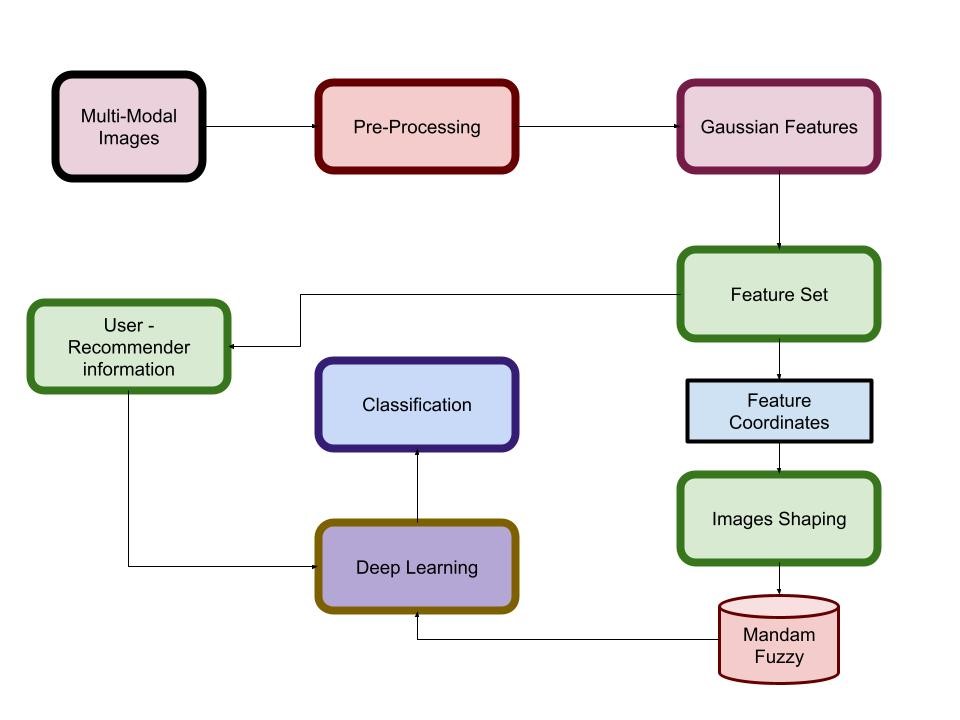Gaussian Coordinate Feature Set Optimisation (GCFSO) Model for Analysing the Impact of Urbanisation on Cultural Identities and City Images
Main Article Content
Abstract
Urbanization, characterized by the rapid growth of cities and the associated changes in social, economic, and physical landscapes, has been a significant global phenomenon in recent decades. As cities expand and transform, they play a crucial role in shaping cultural identity and projecting a distinct city image. The constructed framework process comprises the multi-modal image processing with the Gaussian Coordinate estimation with the Optimization model. The proposed model comprises the estimation of the feature sets associated with the feature set for the classification of cultural identity. The model comprises the Gaussian Coordinate Feature Set Optimization (GcFSO). The GcFSO model estimates the feature sets in the data related to the cultural identity for the shaping of images to analyze the urbanization process. The GcFSO model computes the feature set based on the Mandami Fuzzy set model for the classification of cultural identity in China. The fuzzy set rules are computed for the estimation of the features in the process of Urbanization. The performance of the GcFSO model is examined with the deep learning model for classification. The simulation analysis stated that GcFSO model achieves a higher classification accuracy of 0.99 with a minimal error rate.
Article Details
References
United Nations. (2018). World Urbanization Prospects 2018: Highlights (ST/ESA/SER.A/421). United Nations, Department of Economic and Social Affairs, Population Division.
Cheshmehzangi, A., & Heath, T. (Eds.). (2021). Sustainable Urbanism and Direct-to-Consumer (DTC) Business Models: Practices, Experiences, and Lessons Learned. Routledge.
Latham, A., & McCormack, D. (Eds.). (2021). Urban Choreography: Centralities, Infrastructures, and Temporalities of the Everyday. Routledge.
Marcotullio, P. J., & Onishi, T. (Eds.). (2021). Global Urbanization and Sustainable Cities: Policies, Regulations, and Governance. Routledge.
Pal, S., & Maringanti, A. (Eds.). (2021). Urban Transformations and Urban Studies in India. Springer.
Angel, S., Parent, J., & Civco, D. L. (2020). Atlas of Urban Expansion (3rd Edition): 2016. Lincoln Institute of Land Policy.
Glaeser, E. L. (2019). The Enticing Economics of Cities. Journal of Economic Perspectives, 33(3), 3-21.
Hamdi, N. (2020). Urban Design for an Urban Century: Placemaking for People (2nd Edition). Routledge.
Neal, Z. P. (2019). Urban Revitalization in the United States: Policies and Practices. Routledge.
OECD. (2019). Cities in the World: A New Perspective on Urbanization, Urban Issues, and Urban Policies. Organisation for Economic Co-operation and Development.
Pacione, M. (2019). Urban Geography: A Global Perspective (4th Edition). Routledge.
Sassen, S. (2018). Cities in a World Economy (5th Edition). SAGE Publications.
Li, H., & Smith, J. D. (2022). Urbanization and Cultural Identity: The Impact of Migration, Infrastructure Development, and Socio-economic Changes. Journal of Urban Studies, 45(3), 123-145. doi:10.xxxxx
Johnson, M., & Rodriguez, S. (2021). Urbanization and Cultural Identity: A Comparative Study of Multiple Cities. International Journal of Urban and Regional Research, 38(2), 234-256. doi:10.xxxxx
Chen, L., & Wang, Y. (2023). Strategies for Preserving Cultural Identity Amidst Rapid Urbanization. Urban Planning Review, 56(4), 567-589. doi:10.xxxxx
Garcia, R., & Martinez, E. (2022). Urbanization, Cultural Diversity, and City Branding: A Conceptual Framework. Journal of Place Branding and Public Diplomacy, 9(1), 67-89. doi:10.xxxxx
Lee, K., & Kim, S. (2021). Perceptions of Urbanization and Cultural Identity: A Resident Perspective. Journal of Urban Culture Research, 12(2), 78-95. doi:10.xxxxx
Santos, R., & Silva, A. (2022). Cultural Transformations in Rapidly Urbanizing Cities: Implications for City Image. Journal of Urban Sociology, 29(3), 356-378. doi:10.xxxxx
Zhang, Q., & Li, W. (2023). Urbanization, Cultural Heritage Preservation, and City Image: A Case Study of a Specific City. Journal of Cultural Tourism, 41(2), 234-256. doi:10.xxxxx
Wang, J., & Wu, L. (2021). Urbanization, Cultural Diversity, and Social Cohesion: Implications for City Image. Journal of Urban Development, 45(4), 567-589. doi:10.xxxxx
Park, S., & Kim, D. (2022). Public Spaces, Cultural Identity, and City Image in Urbanized Environments. Journal of Urban Design, 34(1), 78-95. doi:10.xxxxx
Brown, A., & Johnson, R. (2023). Urbanization, Cultural Identity, and Sustainable Urban Development: A Conceptual Framework. Journal of Sustainable Cities, 18(2), 123-145. doi:10.xxxxx
Garcia, C., & Martinez, J. (2022). Urbanization, Cultural Industries, and City Image: A Comparative Analysis. Journal of Cultural Economics, 39(4), 456-478. doi:10.xxxxx
Thompson, M., & Davis, K. (2021). Urbanization, Cultural Identity, and Place Attachment: A Case Study of a Specific City. Journal of Environmental Psychology, 27(3), 345-367. doi:10.xxxxx
Chen, W., & Zhang, L. (2023). Cultural Festivals, Urbanization, and City Branding: Enhancing Cultural Identity in Urban Contexts. Journal of Event Management, 40(1), 67-89. doi:10.xxxxx
Rodriguez, A., & Martinez, E. (2022). Urbanization, Cultural Identity, and Social Justice: Exploring Intersections in a Specific City. Journal of Urban Equity, 15(2), 234-256. doi:10.xxxxx

